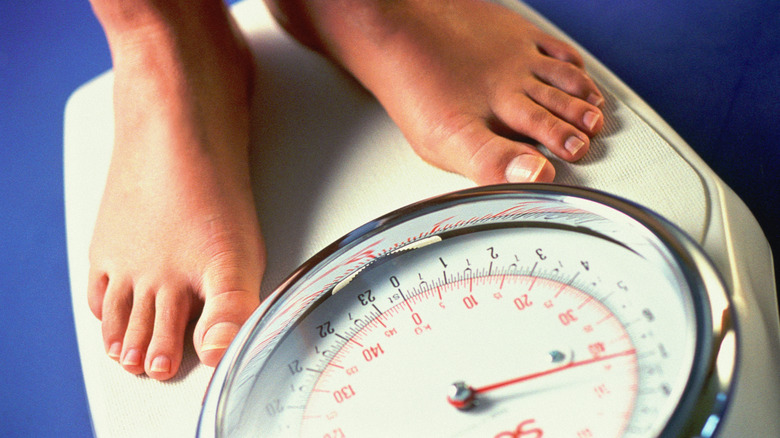This Is What Happens To Your Brain When You're On A Diet
Certain times of the year might make you more motivated to go on a diet. Some people resolve to lose weight as a New Year's resolution, and others intend to shed pounds for a particular event like a wedding, birthday, or class reunion. Or you might be a chronic dieter who's tried every diet, from Atkins to the cabbage soup diet.
While you might be elated once you reach your weight loss goal, it's common for those pounds to subtly creep back on weeks or months later. A 2020 article in BMJ found that low-carb, low-fat, and other popular diet methods are effective at helping you lose weight within six months. However, most of these diets don't sustain this weight loss after a year.
That's because your body has a set point weight, doctors told NBC News. If you're trying to go below your body's set point, your brain will work against your weight loss efforts. When you're constantly losing or gaining weight, your body decides what's the most appropriate weight. You can think of this set point as the temperature of a thermostat. Your body weight might go up or down, but it will make metabolic changes to keep your weight at this set point.
Two hormones that affect your set point weight
While you might be focused on the numbers on the scale, your body knows how much fat you're holding through the hormone leptin, which is secreted into your blood in proportion to your body fat. Leptin decreases your hunger levels. When the leptin levels get lower than your body wants, your body says, "Whoa." This is when your body thinks you're experiencing a famine.
Your body uses less energy for metabolic processes, but your cravings also spike because it wants to get those leptin levels back to the desired set point. This process can occur for up to a year, which is one of the reasons many people gain weight after a diet. Your diet might be healthy, but you might not notice you're eating a little more while you're on a diet (via NBC News).
According to The Healthy, another hormone that affects your set point weight is ghrelin. Your body detects when it's running out of energy, so it triggers this hunger hormone to motivate you to eat. Leptin and ghrelin work to keep your weight where it is rather than where you want it to be so it can survive during periods of feast and famine. After all, our ancestors weren't concerned with how they looked in a bathing suit.
Your body seeks rewards when you're on a diet
Being too rigid while you're dieting can easily backfire. If you're restricting what you eat too much, your brain sees that as deprivation. This makes those high-fat or sugary foods that much more tempting because your brain is looking for a sense of reward after deprivation. And let's face it, eating chicken, broccoli, and brown rice won't give you that feeling of reward. Instead, you can find non-food ways to give you a sense of reward (via The Healthy).
When you think about going on a diet, the idea itself might elicit negative thoughts and feelings. Focusing on restrictive eating patterns can be somewhat stressful, which can increase your cortisol levels and thwart your weight loss goals. You could be happy with rapid weight loss, but the hormone and metabolism changes in your body could have you continually eating fewer calories while your weight loss stalls (per New York Times).
You can reset your set point weight
Working to lower your body's set point can be mentally challenging because you could feel depression, headaches, and fatigue from your brain needing more energy. Your brain will eventually adjust to this new weight, and these symptoms will subside after several weeks. However, changing your body's set point can take several months or years, which is why it's best to look at a long-term, healthy eating approach rather than short-term diet fixes, per The Healthy. Research via the 2020 article in BMJ found that the Mediterranean Diet was the only diet that sustained weight loss for longer than a year.
Don't panic if you're frustrated with your set point. You can train your brain to be happier at a lower weight by focusing on eating healthy foods rather than packaged or processed foods. That means getting away from "diet" foods and eating whole foods like vegetables and nuts. It also helps to be a little more aware of what your body needs rather than what your taste buds want (per NBC News).
This includes using mindfulness exercises to pin down your cravings. Your brain learns certain habits associated with foods, so working with what feelings and behaviors trigger your eating patterns can interrupt that loop of mindless eating (per New York Times).




